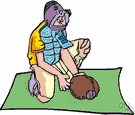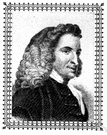Fielding
Also found in: Thesaurus, Medical, Acronyms, Idioms, Encyclopedia, Wikipedia.
Related to Fielding: Henry Fielding
field
(fēld)n.
1.
a. A broad, level, open expanse of land.
b. A meadow: cows grazing in a field.
c. A cultivated expanse of land, especially one devoted to a particular crop: a field of corn.
d. A portion of land or a geologic formation containing a specified natural resource: a copper field.
e. A wide unbroken expanse, as of ice.
2.
a. A battleground.
b. Archaic A battle.
c. The scene or an area of military operations or maneuvers: officers in the field.
3.
a. A background area, as on a flag, painting, or coin: a blue insignia on a field of red.
b. Heraldry The background of a shield or one of the divisions of the background.
4.
a. An area or setting of practical activity or application outside an office, school, factory, or laboratory: biologists working in the field; a product tested in the field.
b. An area or region where business activities are conducted: sales representatives in the field.
5. Sports
a. An area in which an athletic event takes place, especially the area inside or near to a running track, where field events are held.
b. In baseball, the positions on defense or the ability to play defense: She excels in the field.
c. In baseball, one of the three sections of the outfield: He can hit to any field.
6. A range, area, or subject of human activity, interest, or knowledge: several fields of endeavor.
7.
a. The contestants or participants in a competition or athletic event, especially those other than the favorite or winner.
b. The body of riders following a pack of hounds in hunting.
c. The people running in an election for a political office: The field has been reduced to three candidates.
8. Mathematics A set of elements having two operations, designated addition and multiplication, satisfying the conditions that multiplication is distributive over addition, that the set is a group under addition, and that the elements with the exception of the additive identity form a group under multiplication.
9. Physics A physical quantity in a region of space, such as gravitational force or fluid pressure, having a distinct value (scalar, vector, or tensor) at each point.
10. The usually circular area in which the image is rendered by the lens system of an optical instrument. Also called field of view.
11. Computers
a. An element of a database record in which one piece of information is stored.
b. A space, as on an online form or request for information, that accepts the input of text: an address field.
adj.
1. Growing, cultivated, or living in fields or open land.
2. Made, used, or carried on in the field: field operations.
3. Working, operating, or active in the field: field representatives of a firm.
v. field·ed, field·ing, fields
v. tr.
1.
a. Sports To catch or pick up (a ball) and often make a throw to another player, especially in baseball.
b. To respond to or deal with: fielded tough questions from the press.
2.
a. Sports To place in the playing area: field a team.
b. To nominate in an election: field a candidate.
c. To put into action; deploy: field an army of campaign workers.
3. To enter (data) into a field.
v. intr. Sports
Idiom: To play as a fielder: How well can he field?
take the field
To begin or resume activity, as in a sport or military operations.
[Middle English feld, from Old English; see pelə-2 in the Appendix of Indo-European roots.]
Synonyms: field, bailiwick, domain, province, realm, sphere, territory, turf
These nouns denote an area of activity, thought, study, or interest: the field of comparative literature; considers marketing to be her bailiwick; the domain of physics; the province of politics; the realm of constitutional law; a task within his assistant's sphere; the territory of historical research; bureaucrats interested only in protecting their turf.
These nouns denote an area of activity, thought, study, or interest: the field of comparative literature; considers marketing to be her bailiwick; the domain of physics; the province of politics; the realm of constitutional law; a task within his assistant's sphere; the territory of historical research; bureaucrats interested only in protecting their turf.
Field·ing
(fēl′dĭng), Henry 1707-1754. British writer whose works include the novels Joseph Andrews (1742) and Tom Jones (1749). He also wrote comedies for the stage and edited a number of periodicals.
American Heritage® Dictionary of the English Language, Fifth Edition. Copyright © 2016 by Houghton Mifflin Harcourt Publishing Company. Published by Houghton Mifflin Harcourt Publishing Company. All rights reserved.
Fielding
(ˈfiːldɪŋ)n
(Biography) Henry. 1707–54, English novelist and dramatist, noted particularly for his picaresque novel Tom Jones (1749) and for Joseph Andrews (1742), which starts as a parody of Richardson's Pamela: also noted as an enlightened magistrate and a founder of the Bow Street runners (1749)
Collins English Dictionary – Complete and Unabridged, 12th Edition 2014 © HarperCollins Publishers 1991, 1994, 1998, 2000, 2003, 2006, 2007, 2009, 2011, 2014
Field•ing
(ˈfil dɪŋ)n.
Henry, 1707–54, English novelist.
Random House Kernerman Webster's College Dictionary, © 2010 K Dictionaries Ltd. Copyright 2005, 1997, 1991 by Random House, Inc. All rights reserved.
ThesaurusAntonymsRelated WordsSynonymsLegend:
Switch to new thesaurus
| Noun | 1. |  fielding - (baseball) handling the ball while playing in the field fielding - (baseball) handling the ball while playing in the fieldhandling, manipulation - the action of touching with the hands (or the skillful use of the hands) or by the use of mechanical means baseball, baseball game - a ball game played with a bat and ball between two teams of nine players; teams take turns at bat trying to score runs; "he played baseball in high school"; "there was a baseball game on every empty lot"; "there was a desire for National League ball in the area"; "play ball!" |
| 2. |  Fielding - English novelist and dramatist (1707-1754) Fielding - English novelist and dramatist (1707-1754) |
Based on WordNet 3.0, Farlex clipart collection. © 2003-2012 Princeton University, Farlex Inc.